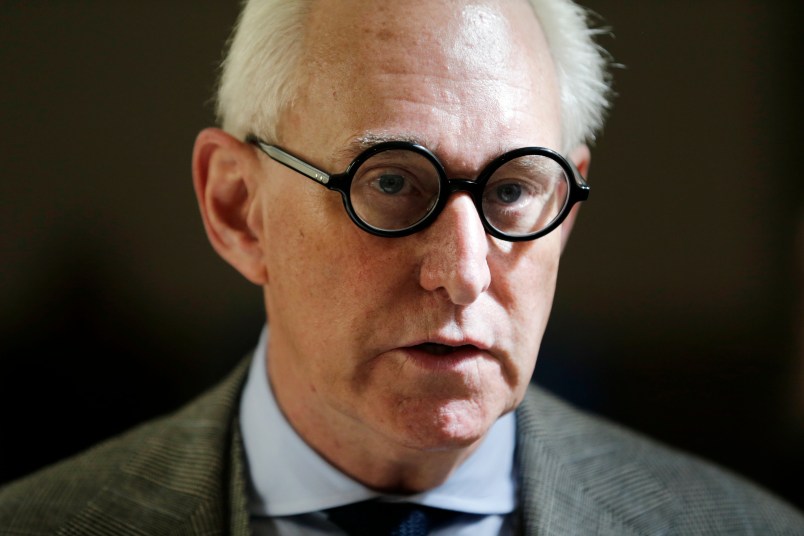Trump confidante Roger Stone was in contact with Wikileaks during the 2016 presidential campaign, Twitter messages obtained by the Atlantic and published Tuesday show.
The messages mark the latest in a series of developments regarding Stone’s relationship with Wikileaks, which published caches of hacked Democratic emails during the 2016 election.
In August 2016, Stone claimed to be in contact with Wikileaks’ founder, Julian Assange, only to later revise his comment, after Wikileaks’ objection, by saying they had communicated through an intermediary. Later that month, Stone tweeted “Trust me, it will soon the Podesta’s time in the barrel,” which was eventually seen — including by the Clinton campaign — as an informed prediction of Wikileaks’ release of Podesta’s hacked emails.
On Oct. 13, just hours after after Wikileaks repeated that it had never been in contact with Roger Stone, it was in contact with Stone, according to the Atlantic.
Stone reportedly wrote to the Wikileaks account on Oct. 13, in a private message:
Since I was all over national TV, cable and print defending wikileaks and assange against the claim that you are Russian agents and debunking the false charges of sexual assault as trumped up bs you may want to rexamine the strategy of attacking me- cordially R.
And Wikileaks responded an hour later, according to the Atlantic:
We appreciate that. However, the false claims of association are being used by the democrats to undermine the impact of our publications. Don’t go there if you don’t want us to correct you.
Stone replied on Oct. 15, according to the report:
“Ha! The more you ‘correct’ me the more people think you’re lying. Your operation leaks like a sieve. You need to figure out who your friends are.”
Wikileaks wrote to Stone again the morning after Trump’s electoral victory, according to the Atlantic:
Happy?
We are now more free to communicate.
Months later, in March 2017, the Atlantic noted, Wikileaks again asserted that neither it nor its founder had never communicated with Stone:
@kyletblaine WikiLeaks & Assange have repeatedly confirmed that they have never communicated with Stone. Why did CNN not include this fact?
— WikiLeaks (@wikileaks) March 20, 2017
In September, the publication noted, Stone told the House Intelligence Committee in a prepared statement that “my communication with WikiLeaks was through the aforementioned journalist,” referring, he later acknowledged, to the radio host Randy Credico. (Credico said regarding that claim: “There was no backchannel to Roger Stone.)
The magazine said Stone confirmed the authenticity of the Twitter messages, but also that called them“ridiculously out of context” and “a paste up.” Stone told the magazine that he’d provided the exchange to the House Intelligence Committee, but the Atlantic said he didn’t provide it with his copy of the exchange.
In addition to Wikileaks, Stone also communicated with Guccifer 2.0, the hacker persona identified by the intelligence community as being involved in the actual theft of Democrats’ emails.
Donald Trump Jr. was in contact with Wikileaks during the campaign, according to messages previously published by the Atlantic. So was Cambridge Analytica, a data firm founded by Trump donor Robert Mercer and hired by the Trump campaign. The firm’s CEO acknowledged in November of last year that it had reached out to Wikileaks during the campaign in hopes of obtaining Clinton’s emails.







All those who are surprised that Roger Stone is implicated in the hacking stuff, raise your hand…
Who has ever believed Roger Stone?
Over and over again, the intelligence community sends the message, for those who have ears to hear: They know everything. Everything.
I mean, he is an interesting dude.
Total snake, but an interesting snake.
And that Assange lies as a matter of course. Both are de facto Putin Stooges. (Along with Trump that makes 3 stooges.)